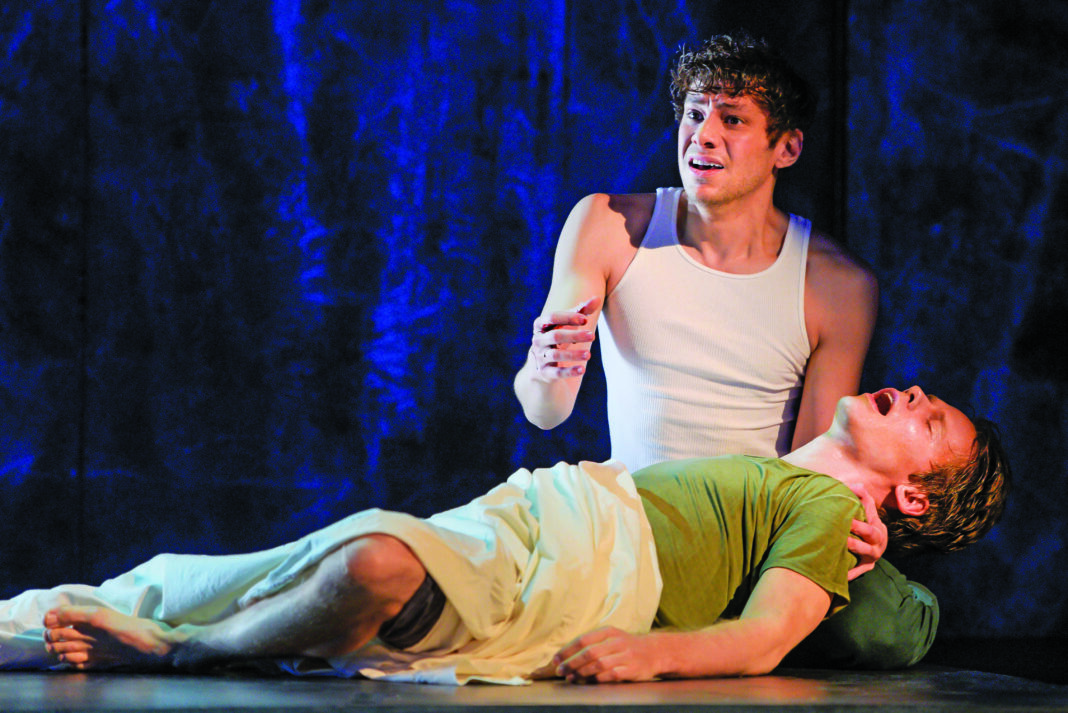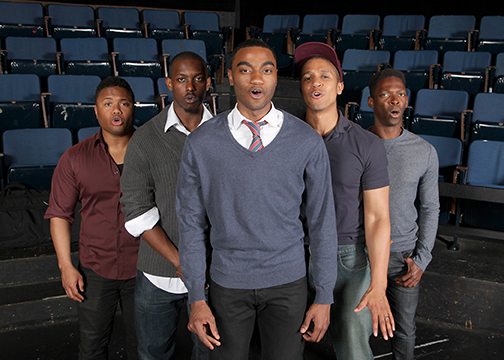There are many lists of “America’s 10 Best Plays,” but all that I’ve seen agree on one thing: Arthur Miller’s Death of a Salesman is the winner, followed by Tony Kushner’s Angels in America. Having just attended the opening of Berkeley Repertory Theatre’s (BRT) splendid production of the latter, I’m tempted to rank them as a near tie. Both are extraordinary examples of how a single play can capture the zeitgeist of a generation in a beautifully structured work of theatrical art that has lived in the national conscience for many years, and doubtless will live there for many more.
I have, however, a couple of caveats about Angels that give an edge to its competitor. First, while Miller takes just under three hours to tell his story, Kushner divides his play into two parts—Millennium Approaches and Perestroika—which have a combined running time of seven-and-a-half hours. Ouch! You can, as I did, see both—one in the afternoon, and the other at night—during one of BRT’s periodic marathons, but that’s a lot to ask in time and expense, especially since (despite its humor and relatively hopeful ending) Perestroika meanders along as an often-repetitive tale of illness and death.
My second caveat pertains to the degree of universal appeal in the two plays. Miller’s warning about the failure of the American Dream involves the whole society; Kushner’s subtitle, A Gay Fantasia on National Themes, speaks for itself. Almost everything that happens in the 1985 world of Millennium Approaches is given a gay perspective, often with an overlay of Judaism. It’s as if a curtain is being lifted on a foreign culture, whose intimate secrets are gradually revealed. At the same time, not everyone will feel the connection.
So, what was this gay world of 1985 like? The historic social, sexual and political revolution of the ’60s and ’70s has run its course and the “me first” conservative counter-revolution led by Ronald Reagan is well underway. There’s talk of Star Wars with the Soviets, while Ollie North and the CIA play with fire in Central America and Iran’s leaders play footsie with an election-bound U.S. president over the release of American hostages. Closer to home, both humanistic morality and traditional religion are in full retreat. Rumors of corporate corruption within the highest levels of government abound. In a nutshell, the outlook for liberal democracy is bleak.
Important as this background is, it is overshadowed by the convergence of two events that particularly affect the homosexual community: The movement to break free of the closet, and the advent of the AIDS epidemic. Kushner skillfully reveals the consequences through his characters, and BRT’s actors bring them to life with unfailing clarity.
Joe Pitt (Danny Binstock), an ambitious young attorney, and his wife Harper (Bethany Jillard) have their marriage crumble around them when he finally admits his sexual orientation and she exhibits signs of the feminist revolution that was beginning to sweep the country.
Roy Cohn (Stephen Spinella), the famed McCarthy Era prosecutor who helped send Ethel Rosenberg (Carmen Roman) to the electric chair, will fight to the finish against the dark curse that threatens them all—even to the point of refusing to give it a name.
Prior Walter (Randy Harrison) is devastated when his longtime partner, Louis (Benjamin T. Ismail) deserts him after his AIDS begins to spread. Belize (Caldwell Tidicue) brings welcome “trench humor” to the role of the hospital orderly who watches as people die.
The Angel (Francesca Faridany on opening night, to be replaced by Lisa Ramirez after the first few performances) flies in amidst the crash of a falling ceiling that announces the coming apocalypse.
All in all, it’s a superb production, sensitively directed by Tony Taccone, who helped birth this remarkable play more than 25 years ago and is just now bringing it to the stage of the theater he heads. Angels in America may not be number one on the charts, but runner-up isn’t exactly shabby.
NOW PLAYING: Angels in America runs through July 22 at Berkeley Repertory Theatre, 2015 Addison St., Berkeley; 510/647-2949; berkeleyrep.org.









